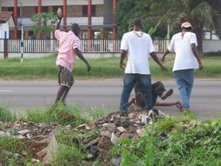
It was a quiet and peaceful June afternoon on the streets of Asylum Down until a middle-aged woman screamed “thief”. A young man wearing jeans and a T-shirt and holding what looked like a woman’s purse briskly walked away down a side street.
A man ran after the young man and grabbed him. Soon young men emerged from houses, businesses and connecting streets, many running with an enthusiasm usually reserved for the football pitch. Some carried large sticks. Suddenly, the young man with the purse was being slapped and punched. Soon bloodied and with a ripped shirt, he was forced to walk toward a traffic-heavy road about 100 metres away. As he walked, punches came in from different angles, landing on his face, back, legs and arms.
One young woman held her hands to her head, gasping at the violent scene. A well-dressed couple stopped to gaze a few metres from the crowd. Shop owners and clients came out to the street side to observe the commotion. A boy, not older than 10, followed the procession. “He won’t steal again,” he said smiling. A middle-aged man laughed. “He deserves it.” Once at Ring Road, the young man collapsed, blood dripping from his head. Three young men continued to beat him, until one of them, in a final blow, smashed a chunk of concrete over him.
The crowd dispersed. Cars sped past. And the young man, still breathing though severely injured, lay in the street, a victim of “vigilante justice”.On Tuesday, August 8, 2006, some radio stations reported the death of two suspected armed robbers who had been lynched at Akweteman near Lapaz. They were not given the opportunity to defend themselves. Judge, Jury and Executioner
There are no available statistics on the frequency in Ghana of instant or mob or vigilante justice, as it is variously called. But anecdotal evidence suggests that many Ghanaians have either seen it firsthand or heard of it happening. The 2005 U.S. State Department’s report on human rights practices in Ghana stated there was “a sharp increase in incidents of vigilante justice” during the year, though this conclusion might have been drawn because of improved news reporting.
The more sensational cases are often reported in the news, especially if there is a death. Earlier this year, it was reported that a mob near 37 Military Hospital beat an accused criminal, threw a tire around him and set him on fire. Samuel Bosompem, Public Relations Officer of the Commission for Human Rights and Administrative Justice (CHRAJ), said vigilante justice is the result of a widespread lack of faith in Ghana’s criminal justice system.
“In a democratic society, if there is real law and order and people place their trust and faith in justice delivery…then vigilante justice wouldn’t happen,” he said.
Many Ghanaians believe, rightly or wrongly, that criminals will not be arrested or prosecuted. Many also believe that even if criminals are apprehended by the police, they can buy their way out. A 2005 public opinion survey by the Ghana Integrity Initiative found the police to be the public institution most frequently perceived as corrupt (77 per cent of respondents). But Kwesi Ofori, Deputy Director of police public affairs, said this perception is largely misplaced. “It is not a question of people bringing someone in and [the police] not doing the right thing,” he said.
Ofori said there is a large gap between what the police are doing to enforce the law and what the public perceives them to be doing. For this reason, he said, the police have begun educational programmes on radio and television, in schools and in communities.
“People should have confidence in due process,” he said. “We know it takes time, but that is the order of things.” The police are also accused by many Ghanaians of not having enough street presence. They argue that if there were more police patrolling city streets, there wouldn’t be the need to take matters into their own hands.
“We agree that the number [of police officers] is not adequate,” Ofori said. “Government has made a target that we turn out 2000 police every year, and this government directive has really helped us recruit.” But Bosompem said that it will take more government funding toward the police and judiciary to perform their functions well before confidence is restored in the public.
Extenuating circumstances wouldn’t remove his guilt, but most reasonable people would agree that his behaviour was more understandable, especially since he hadn’t used violence to achieve his ends. Another negative consequence of vigilante justice is that it perpetuates society’s acceptance of violence. Vigilante groups use violence to punish accused criminals and use violence to deter would-be criminals. A society that accepts these groups, accepts violence as a means to an end.
This is most troublesome for the youth who observe vigilante justice unfold. Next time a parent or teacher tells the young boy at the beginning of the article not to hit, that message will compete with his memory of vigilante justice. He may question why he wouldn’t be justified in using force next time someone wrongs him on the playground.
The Citizen’s Role Citizens have an important role to play in supporting the criminal justice system, say legal experts. They have a duty to inform police of suspected criminals and to hand them over, unharmed, if they’ve been caught. Citizens also need to be willing to give evidence at courts of law when they have information about criminal acts. “People view going to court as wasteful,” Bosompem said. “That mindset needs to change. We need to be ready to sacrifice to help the Police.”
Ofori said there might be confusion with some Ghanaians about the use of force to defend oneself, but there shouldn’t be because the law is clear on the matter. “If people feel threatened they are permitted to use an appropriate commensurate force to defend themselves,” he said. “[But only after] all other means are exhausted to stop the crime.”